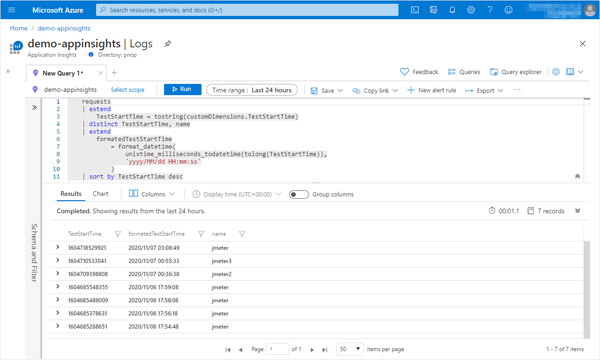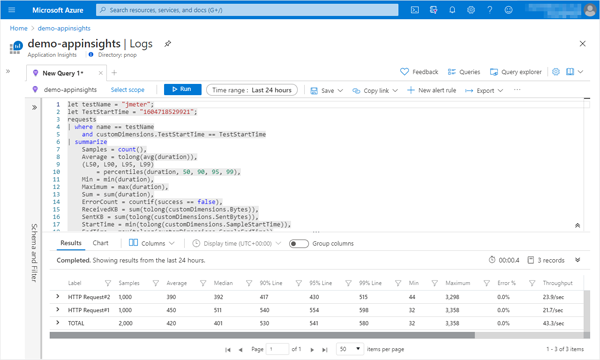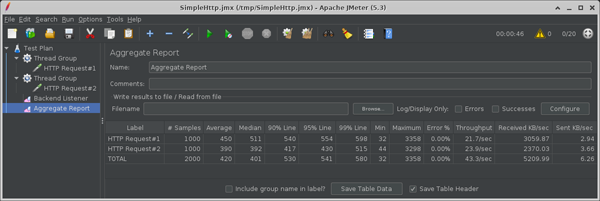Visualizing Apache JMeter™ Aggregate Report with Azure Application Insights and Log Analytics
I will show you how to use the jmeter-backend-azure plugin to reference JMeter Aggregate Report in Azure Application Insights / Log Analytics.
To flexibly visualize, analyze, and manage JMeter test results, you can use Azure Application Insights.
This is accomplished by using the jmeter-backend-azure plugin to send the test results to Application Insights.
And if that Application Insights is workspace-based, it can be integrated with Log Analytics and benefit from that as well.
This article explains how to view the JMeter Aggregate Report in Azure Application Insights.
Installing the jmeter-backend-azure plugin and sending the test results to Azure Application Insights
Please refer to the jmeter-backend-azure README, which is easy to understand.
Visualizing Test Results with Azure Application Insights / Log Analytics
You can flexibly visualize and analyze test results by writing Kusto query (kql) on the “Logs” or the “Workbooks”.
Note that the table and column names are different between Application Insights and Log Analytics.
This is a mapping of the table and columns referenced in the samples in this article.
| - | Application Insights | Log Analytics |
|---|---|---|
| Table | requests | AppRequests |
| Column | name | Name |
| success | Success | |
| duration | DurationMs | |
| customDimensions | Properties |
The following samples in this article are for Application Insights.
If you use Log Analytics, follow the mapping above and replace the table and column names.
-
Narrow down your view and analysis targets
“requests” (Application Insights) / “AppRequests” (Log Analytics) table may contain all the test results JMeter sent to Application Insights, as well as other logs that are not JMeter.
If you want to visualize or analyze results for a single test only, you can narrow it down with “name” and “customDimensions.TestStartTime”.You can also narrow it down by “name” only by changing the “testName” of the Backend Listener each time you test.
The following Kusto will get a list of names and TestStartTime.
requests | extend TestStartTime = tostring(customDimensions.TestStartTime) | distinct TestStartTime, name | extend formattedTestStartTime = format_datetime( unixtime_milliseconds_todatetime(tolong(TestStartTime)), 'yyyy/MM/dd HH:mm:ss' ) | sort by TestStartTime desc -
Aggregate Report
It extracts the same informations as the Aggregate Report listener in JMeter.let testName = "<The value of the previously obtained "name">"; let TestStartTime = "<The value of the previously obtained "TestStartTime">"; requests | where name == testName and customDimensions.TestStartTime == TestStartTime | summarize Samples = count(), Average = tolong(avg(duration)), (L50, L90, L95, L99) = percentiles(duration, 50, 90, 95, 99), Min = min(duration), Maximum = max(duration), ErrorCount = countif(success == false), ReceivedKB = sum(tolong(customDimensions.Bytes)), SentKB = sum(tolong(customDimensions.SentBytes)), StartTime = min(tolong(customDimensions.SampleStartTime)), EndTime = max(tolong(customDimensions.SampleEndTime)) by Label = tostring(customDimensions.SampleLabel) | extend s = 0 | union ( requests | where name == testName and customDimensions.TestStartTime == TestStartTime | summarize Samples = count(), Average = tolong(avg(duration)), (L50, L90, L95, L99) = percentiles(duration, 50, 90, 95, 99), Min = min(duration), Maximum = max(duration), ErrorCount = countif(success == false), ReceivedKB = sum(tolong(customDimensions.Bytes)), SentKB = sum(tolong(customDimensions.SentBytes)), StartTime = min(tolong(customDimensions.SampleStartTime)), EndTime = max(tolong(customDimensions.SampleEndTime)) | extend Label = 'TOTAL', s = 9 ) | extend tp = Samples / ((EndTime - StartTime) / 1000.0), KBPeriod = (EndTime - StartTime) * 1024 / 1000.0 | sort by s asc | project Label, Samples, Average, Median = round(L50), ['90% Line'] = round(L90), ['95% Line'] = round(L95), ['99% Line'] = round(L99), Min, Maximum, ['Error %'] = strcat(round(ErrorCount * 100.0 / Samples, 2), '%'), ['Throughput'] = iif(tp < 1.0, strcat(round(tp * 60, 1), '/min'), strcat(round(tp, 1), '/sec') ), ['Received KB/sec'] = round(ReceivedKB / KBPeriod, 2), ['Sent KB/sec'] = round(SentKB / KBPeriod, 2) | project-reorder Label, Samples, Average, ['Median'], ['90% Line'], ['95% Line'], ['99% Line'], Min, Maximum, ['Error %'], ['Throughput'], ['Received KB/sec'], ['Sent KB/sec']The values of Median, 90% Line, 95% Line, and 99% Line seem to differ from the Aggregate Report in JMeter in some cases.
This seems to be because the percentiles function of the Kusto is calculated by estimation.
I explained how to reference JMeter test results in Azure Application Insights using a Kusto query.
In the future, I will also introduce the Kusto query, which outputs the same results as other listeners.



